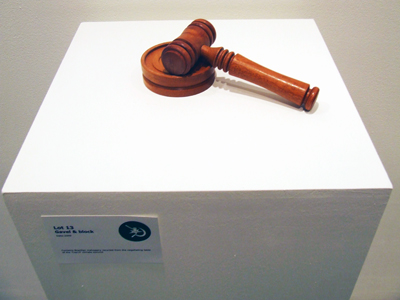joint projects
Lot 13


Gavel and block
Date:2009
Contains Brazilian mahogany recycled from the negotiating table of the ‘Cop15’ climate summit.
Since the Federal Council of Autonomous Zones has, in its largesse decreed that from 28th November 2037 that all cash transactions are to be abolished, this will be the last auction* of its type in the world.
This ‘lovingly hand-crafted mahogany’ gavel and block comes from an area once known as the ‘Brazilian rainforest’. Stories still circulate of ancient forest-dwelling tribes living sustainably in this once vast and pristine ecosystem.
Illegal exploitation of this areas resources, (including a trade in hardwoods dominated by the United states and Britain) was responsible for human rights abuses, community breakdown and genocide.
Incursions by capitalist cultures systematically exterminated the indigenous communities, and with them the proof that life without hierarchy, money or notions of inevitable scarcity was possible.
It is difficult to untangle legend from historical fact, but it is nevertheless interesting that such cultures, if they existed at all, should have shared the very same values we see as the cornerstones of our own society.
We feel confident that Lot 13 will be a much sought after item not only a symbol of the late-capitalist era - but, with the last bang of the gavel - a final end to the history of its enduring legacy.

Provenance
‘The undersigned companies dedicated to the timber industry... declare…that they are committed not to utilize or acquire illegal logs or timber originating from Indian Reserves.’
- Declaration by the Association for Timber Exporters from the Brazilian State of Pará, December 1992
This agreement was signed the following year by both Brazilian timber exporters and British importers. It came amid rising international concern over the plundering of timber from the land of Brazil’s Indian tribes, which is protected under the country’s constitution. However, it was by their own admission a ‘gentlemen’s agreement’, voluntary in every respect, or as they say in the Brazilian State of Pará, “For the English to see”.
This phrase is commonly used in the region to mean ‘for appearance’s sake’. It originated in the mid-nineteenth century when Brazilian landowners feigned compliance with the anti-slavery laws of the British Empire by hiding their slaves from the view of British traders. Concerned British parties would be shown instead a plantation without slaves, or one “for the English to see”. It is especially appropriate when used in connection with the theft of indigenous wood.
The campaign against the illegal timber trade, especially mahogany from Brazil’s reserves, included a group of “ethical shoplifters” from Norwich, who in 1993 ‘liberated’ several items of mahogany furniture from their local department store. These were then taken to the local police station, where the protesters demanded that the items be investigated as stolen property belonging to the indigenous peoples of Brazil. Others tried to recover an entire dining set from Harrods. 1